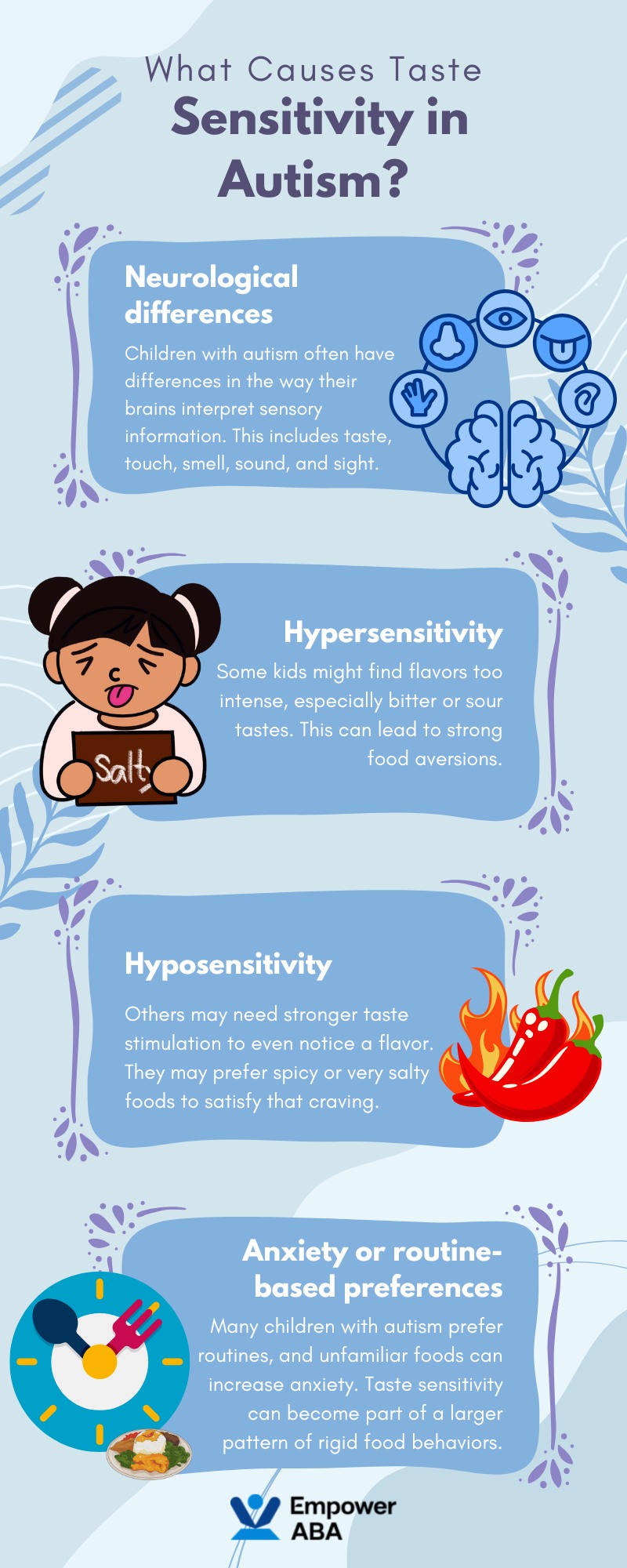Key Points:
- Children with autism are more likely to experience heightened or reduced taste sensitivity, impacting their eating habits and preferences.
- Understanding the causes behind autism taste sensitivity can help parents better support their child’s nutritional needs and mealtime experiences.
- Practical strategies, including gradual exposure and sensory-friendly environments, can make a significant difference in reducing stress related to food and eating.
Navigating mealtimes with a child on the autism spectrum can be a daily challenge. One day, a favorite snack is devoured; the next, it’s completely rejected. For many parents, this experience is frustrating, confusing, and emotionally draining.
But there’s often more to the story than “picky eating.” Many children with autism experience taste sensitivities that shape how, what, and when they eat. This isn’t just about preferences—it’s a real sensory issue. Understanding autism taste sensitivity can help families feel more empowered and less alone.
Is There a Link Between Autism and Taste Sensitivity?
Yes—children with autism often have different taste sensitivities compared to their peers.
This means they might find certain foods overwhelmingly bitter, sour, or bland. On the flip side, some children might crave extreme flavors, like very salty or sweet foods. These sensitivities stem from how their sensory system processes information. While every child is unique, research consistently shows that children with autism are more likely to have heightened or reduced responses to taste, smell, texture, and temperature. Exploring these unique sensory experiences further can help us understand behaviors such as sugar cravings, which is why we invite you to read our detailed article, Autism and Sugar Addiction: Causes, Effects, and Solutions.
What Causes Taste Sensitivity in Autism?
Understanding the root of taste sensitivities helps reduce frustration and guide supportive actions.
Autism affects how the brain processes sensory input, including taste. While scientists are still exploring all the reasons why, some known causes include:

Understanding these patterns helps parents respond with empathy instead of pressure.
How Does Taste Sensitivity Impact Daily Life?
These sensitivities don’t just affect meals—they can influence social experiences, nutrition, and family dynamics.
Children with autism taste sensitivity might:
- Refuse entire food groups, leading to limited diets.
- Struggle in social settings where food is a central activity (birthday parties, school lunches).
- Experience distress or meltdowns at mealtimes.
- Develop nutritional deficiencies if their diets lack variety.
This doesn’t mean there’s no hope—it just means parents need tools and patience to help their children navigate food more comfortably.
5 Signs of Taste Sensitivity To Watch For
Parents often know something is “off” with food preferences, but it helps to watch for specific signs.
Some clues that your child may have autism taste sensitivity include:
- Gagging or vomiting when trying new or strong-flavored foods.
- Preferring only bland or specific-textured items like crackers or pasta.
- Avoiding mixed foods, like casseroles or sandwiches.
- Frequently sniffing food before eating.
- Asking for extremely flavored items (like very salty chips) repeatedly.
These behaviors may seem like defiance or pickiness, but they often signal a deeper sensory issue.
5 Practical Tips For Managing Taste Sensitivity
With compassion, patience, and a bit of creativity, families can find ways to support better eating habits.
Here are some practical approaches that can help:
1. Create A Predictable Mealtime Routine
Structure helps kids with autism feel safe. Try:
- Serving meals at the same time daily.
- Offering a visual menu board or schedule.
- Giving advance notice before transitioning to meals.
2. Use Gradual Exposure Techniques
Introducing new foods slowly can reduce anxiety and increase acceptance.
- Start with small amounts alongside preferred foods.
- Allow your child to interact with new foods—touching, smelling—without pressure to eat them.
- Celebrate any small step forward.
3. Respect Food Preferences While Encouraging Variety
You don’t need to force your child to eat everything. Instead:
- Build meals around “safe” foods while sneaking in slight variations.
- Use shapes, colors, or dips to make food more engaging.
- Allow some control, such as choosing between two options.
4. Offer Sensory-Friendly Food Environments
The environment where your child eats can make a huge difference.
- Minimize strong smells from other foods.
- Reduce noise and distractions (TV off, quiet room).
- Provide preferred utensils or plates to increase comfort.
5. Work With A Team If Needed
Sometimes professional support is necessary.
- Pediatric dietitians can address nutritional gaps.
- Occupational therapists can help with sensory challenges.
- ABA therapists can support behavioral strategies related to food routines.
When Should Parents Be Concerned?
Occasional food pickiness is common in all children. But if your child:
- Eats fewer than 10–15 different foods,
- Shows signs of distress during most meals,
- Has difficulty gaining weight or maintaining nutrition,
…then it’s time to seek support. Early intervention can make a big difference—not just for eating habits, but for your child’s overall development and quality of life.
ABA Therapy Can Help: Support From Empower ABA
Parents don’t have to navigate these challenges alone. Empower ABA provides expert guidance and therapy to help children thrive, especially in areas like taste sensitivity and food behavior. Through customized Applied Behavior Analysis (ABA) therapy, children learn in a step-by-step, supportive way that fits their unique needs.
ABA therapy in New York, New Jersey, and Virginia can be a game-changer for families facing complex eating behaviors. Empower ABA uses evidence-based strategies to help children build flexibility, reduce anxiety around food, and increase mealtime success—all while strengthening family routines.
If taste sensitivity is affecting your child’s well-being, reach out to us to explore how therapy can help. Compassionate support is just a call away!

